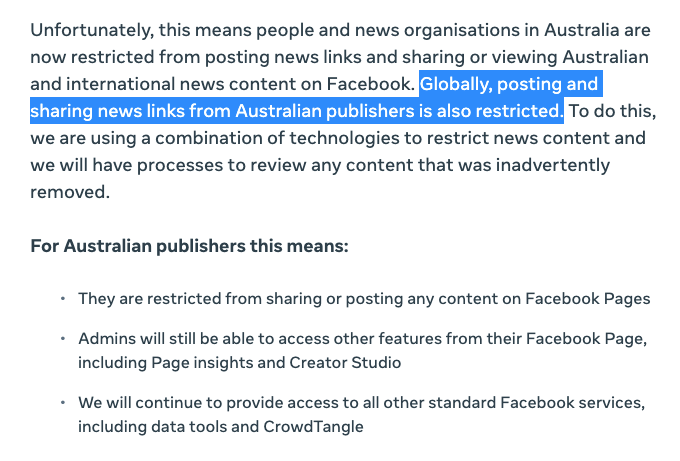
1. Here's my summary of what the Australian media law does. It is not a 'link tax.' First, the bill is one result of a multi-year extremely in-depth investigation by highly respected Australian Competition and Consumer Commission head Rod Sims. mattstoller.substack.com/p/australia-st…
2. The important part is to recognize that the law only applies to digital platforms who are dominant and have a bargaining imbalance with media outlets. It is an anti-monopoly law. This graph shows the monopoly problem. 

3. The bill says that the only platforms who have to bargain with publishers are those who have a "significant bargaining imbalance." And both sides must engage in good faith bargaining, recognizing the value the platform and the publisher provide. parlinfo.aph.gov.au/parlInfo/downl…
4. Much of the bill has to do with designating who gets to be a news publisher. The bill says pure opinion stuff doesn't count, and neither does pure sports and entertainment. Media outlets have to register with the gov't to get bargaining rights.
5. The bill mandates that digital platforms tell media outlets in advance what data they collect and when they are going to change important algorithms on which those outlets rely. They only have to forewarn on important changes, not routine ones.
6. "The policy intent is that changes are likely to be considered significant if they are likely to result in an approximately 20% or greater change in referral traffic to registered news businesses as a whole."
I mean, that's... good?
I mean, that's... good?
7. Platforms also have to tell news outlets about the data they collect. They don't have to share it, but they have to explain what they are doing. It is also a non-discrimination regime. Platforms have to treat non-news entities like news entities. Again, this seems... good? 

8. It is also a transparency measure. Platforms have to give publishers information about how they profit.
"During arbitration, either party may make one request that the other party provide it with information if the request is reasonable for the purposes of the arbitration."
"During arbitration, either party may make one request that the other party provide it with information if the request is reasonable for the purposes of the arbitration."
8. News outlets and platforms can negotiate however they want. The platform can pay based on traffic or simply cover a percentage of news gathering costs. But only, and this is the key point, if there is a bargaining imbalance, aka if the platform is taking all the ad revenue. 

9. If they can't reach a deal, then an arbitrator steps in. The arbitrator must consider three things. The value of the platform's services and the value of the news, the cost of the platform's services and the cost of the news, and the bargaining imbalance between them. 

10. The idea is to mimic a healthy market. "This allows the panel, in making their determination, to consider the outcome of a hypothetical scenario where commercial negotiations take place in the absence of the bargaining power imbalance."
11. A better solution would be to create a real market, to break up these firms, like Newscorp recommended and the ACCC rejected (so much for Murdoch bogeyman). But the reality is Australia is a small country, and it can't do it alone. It's stuck with regulation.
12. Anyway, that's what Facebook rejected. No transparency. No notification of algorithm changes. No bargaining. Their way or the highway.
• • •
Missing some Tweet in this thread? You can try to
force a refresh




